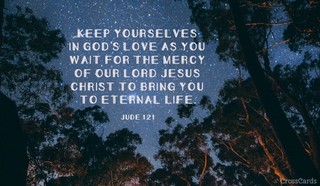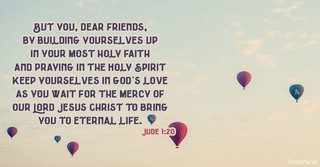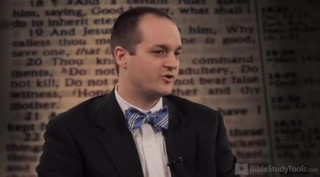
- Recent Translations
- All Translations
Yehuda 1:6
Share
Settings
Yehuda 1:6 Meaning and Commentary
And the angels which kept not their first estate
Or "principality"; that holy, honourable, and happy condition, in which they were created; for they were created in perfect holiness and righteousness, stood in the relation of sons to God, and were, for the lustre of their nature, comparable to the morning stars; they were among the thrones, dominions, principalities, and powers; were a superior rank of creatures to men, and who beheld the face, and enjoyed the presence of God; but this estate they kept not, for being mutable creatures, one of them first sinning, the rest were drawn into it by him, and so were not what they were before, nor in the same estate, or place:
but left their own habitation;
by attempting to rise higher; or by quitting their station and posts of honour, being unwilling to be subject to God, and especially to the Son of God, who was to assume human nature, and in it be above them, which they could not bear; and by gathering together in a body, in another place, with Satan at the head of them; though this may be considered as a part of their punishment, and they may be said to do what they were forced to; for they were drove out of their native habitation, heaven; they were turned out of it, and cast down to hell; see ( 2 Peter 2:4 ) . And this their habitation, which they left, or fell from, or they were cast out of, is by the Jews frequently called the place of their holiness, or their holy place F7.
He hath reserved in everlasting chains, under darkness;
by these "everlasting chains" may be meant the power and providence of God over them, which always abide upon them; or their sins, and the guilt of them upon their consciences, under which they are continually held; or the decrees and purposes of God concerning their final punishment and destruction, which are immutable and irreversible, and from which there is no freeing themselves:, the phrase, under darkness, may refer to the chains, as in ( 2 Peter 2:4 ) ; where they are called "chains of darkness"; either because the power, providence, and purposes of God are invisible; so the Syriac version reads, "in unknown chains"; or because horror and black despair are the effects of sin, and its guilt, with which their consciences are continually filled: or it may denote the place and state where they are, either in the darkness of the air, or in the dark parts of the earth, or in hell, where is utter darkness, even blackness of darkness; or that they are under the power of sin, which is darkness, and without the light of God's countenance, or any spiritual knowledge, or comfort: and they are "reserved" in these chains, and under this darkness; or "in prison", as the Arabic version renders it; which denotes the custody of them, and their continuance in it, in which they are kept by Jesus Christ, who can bind and loose Satan at his pleasure; and it shows that they are not as yet in full torment, but are like malefactors that are kept in prison, until the assize comes: so these are laid in chains, and kept in custody
unto the judgment of the great day;
that is, the future and last "judgment" of men and devils, which is certain, and will be universal, and executed with the strictest justice: this is called "a day", which is fixed by God, though unknown to men and angels; and because of the evidence and quick dispatch of things, the matters judged will be as clear as the day, and finished at once; and a great one, for the Judge will appear in great glory; great things will be done, the dead will be raised, and all nations will be gathered together, and the process will be with great solemnity; the thrones will be set, the books opened, the several sentences pronounced, and, all punctually executed; the judgment of the great day is the same the Jews call (abr anyd Mwy) , "the day of the great judgment" F8. This account shows the imprisoned state of the devils, that they are not their own lords, and cannot do as they would; they are under restraints, and in chains, and not to be feared; which must be a great mortification to their proud and malicious spirits: and since this is the case of fallen angels, what severity may be expected from God against the opposers of the truths of the Gospel?
F7 Yalkut Simeoni, par. 2. fol. 73. 1. Pirke Eliezer, c. 14, 22, 27. Zohar in Gen. fol. 28. 1. & Sepher Bahir in ib. fol. 27. 3.
F8 Targum in Psal. l. 3.

